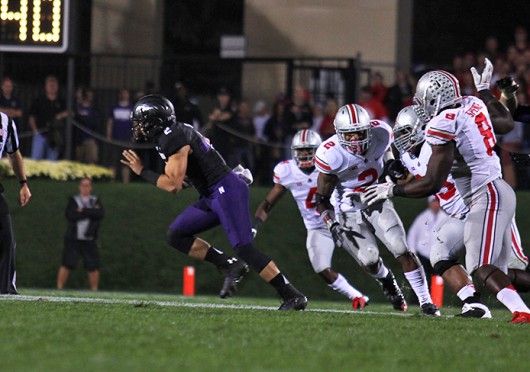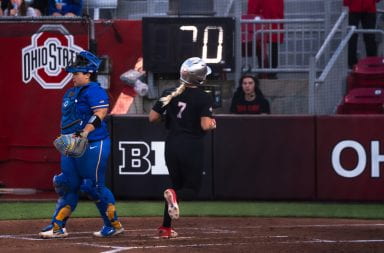
Then-senior Northwestern quarterback Kain Colter (2) avoids OSU defenders during a game Oct. 5 at Ryan Field. OSU won, 40-30.
Credit: Shelby Lum / Photo editor
Steps have been taken to scale what has for years seemed like an insurmountable mountain in college athletics — the debate over college athletes becoming school employees and getting paid — but don’t expect to see Urban Meyer offering his support any time soon.
Although the National Labor Relations Board’s Chicago district gave Northwestern University football players the right to formally establish a union on March 26 — thus considering them school employees — Ohio State’s football coach does not see eye-to-eye with the ruling.
“I don’t feel that at all,” Meyer said Tuesday after OSU spring practice when asked if he saw student-athletes as employees. “What I do feel is that I’ve always been a pro-student (guy) … students should get more than what they get. But it gets so complicated.”
The complications that come with the decision move across the college football landscape as a whole to the current members of the Northwestern football team, some who showed support for the unionization movement and who also dodged questions from the media after their first spring practice Tuesday, according to The Chicago Tribune.
“I am focusing on football and football only right now,” Wildcat senior running back Treyvon Green told the Tribune, going on to say he didn’t have a comment on whether or not he feels the same way he did in January when players — including former quarterback Kain Colter, who is the face of the movement — signed on in support of the right to join a union.
Meyer and the rest of the coaches in the Big Ten, however, won’t have to immediately worry about their players doing the same, as the ruling only applies to private institutions — Northwestern sits as the lone private school in the conference.
Meyer, however, said he has not “immersed” himself in the situation and is unable to give a full and informed response. But when it comes to money, the coach did say potential student-athletes should be able to visit campus free of charge.
“I think students, athletes, parents should come on visits and shouldn’t have to pay for it,” Meyer said. “They should get a stipend.”
Anything beyond that? No way.
“But to say they should go out and get their own shoe contracts and things … I start hearing that and I’m like, ‘Whoa. What could that do for this great sport?’” Meyer said. “And really, what would that do for college athletics as a whole?”
OSU Provost and Executive Vice President Joseph Steinmetz joined Meyer as another OSU employee who wasn’t “really knowledgeable” on the happenings in Evanston, Ill., but he said he has concerns about its repercussions.
“My concern, I think, is two-fold for situations like that. One is, it will affect the major sports and I hope it just doesn’t damage the ‘non-revenue’ sports that are extremely important, which are a majority of the athletes that we have,” Steinmetz said in an interview with The Lantern Tuesday. “The other concern I always have when there is a shift in the economics, in this particular case, is, one of the things we’re really proud of at Ohio State is that our student-athletes do really well academically. They’re among the top in the country, not only in the Big Ten, but in the country. I really am concerned, again as the chief academic officer, about anything that would damage the ability for those students to do well, and for us to assist those students through athletics because a lot of their budget goes to the academic assistance of the students that are there.”
Northwestern plans to start appealing the decision by the NLRB by April 9, and issued a statement about its opinion on regional director of the NLRB Peter Sung Ohr’s decision.
“While we respect the NLRB process and the regional director’s opinion, we disagree with it,” the statement read. “Northwestern believes strongly that our student athletes are not employees, but students. Unionization and collective bargaining are not the appropriate methods to address the concerns raised by student athletes.”
While Meyer, Steinmetz and Northwestern have reservations about players unionizing, one Ohio lawmaker — Democratic Sen. Sherrod Brown — supports Colter’s cause, and the two met on Capitol Hill Wednesday, where Brown offered up his support.
“The right to fair treatment is why all workers, no matter the job or venue, should have the opportunity to unionize,” Brown said in a statement. “College athletes dedicate the same hours to their sport as full-time employees and deserve the same protections as any other worker. I offer whatever assistance I can to Mr. Colter and his colleagues to help athletes organize and ensure their rights are commensurate with their sacrifice and responsibilities.”
The NLRB’s ruling is based off a link between the players’ time commitment athletically and academically, and is a move that is making waves across the country.
“I don’t necessarily agree with football players being unionized,” OSU senior defensive lineman Michael Bennett said after spring practice March 27. “We don’t necessarily see the money, but we are getting a lot of benefit out of our scholarships. It just kind of seems silly to want to be unionized.”
While the country waits to see if Northwestern wins its appeal, the track beyond that is also unknown, because if the institution comes out on the wrong side of the decision, a trip to federal court is likely imminent.
“That’s different,” OSU defensive line coach Larry Johnson said March 27 regarding the current and former Northwestern players’ push. “It’s neat that the players feel they’re doing the right thing … It’s going to change college football.”
Either way, the move by Colter and company is sure to change the landscape of the sport — and college athletics as a whole. The NCAA mandates student-athletes are only allowed to practice 20 hours per week under supervision. That’s a rule Meyer supports, but recognizes success at this level goes beyond just that time.
“It’s a great rule,” Meyer said. “Mandated means ‘with us.’ A quarterback can’t play college football at a high, high level at 20 hours per week. But he’s gotta do it on his own … If they’re watching an hour clock, if they’re punching out after 20 hours, you probably have a pretty average player there.”
If a union is indeed in the cards, the players at Northwestern — and those other schools that choose to follow suit — would have the opportunities to push for wage increase, health care benefits and even a cut down on that time at work.
“If that is best for the players, why not take a look at it and listen?” Johnson said.
If the members of the union want to get more of a stipend, Bennett said that much would be beneficial due to the current state of the economy.
“The cost of living’s going up and I don’t think that our stipend is going up,” Bennett said. “So obviously a little bit more money is nice, but I’m not really in the business of trying to force people to do that.”


